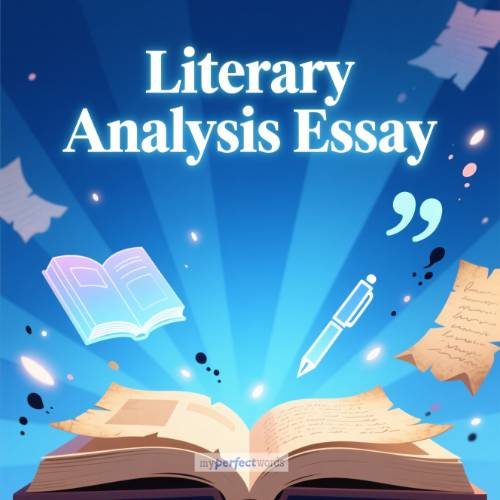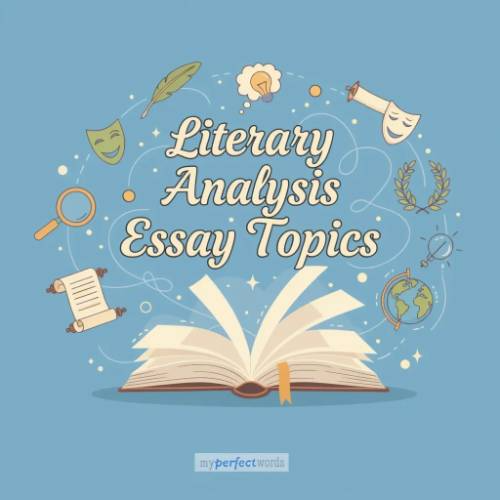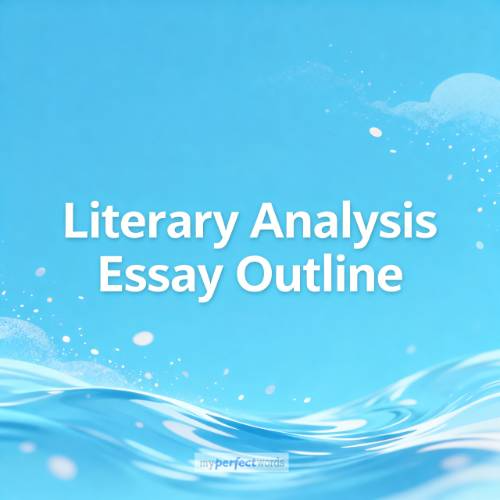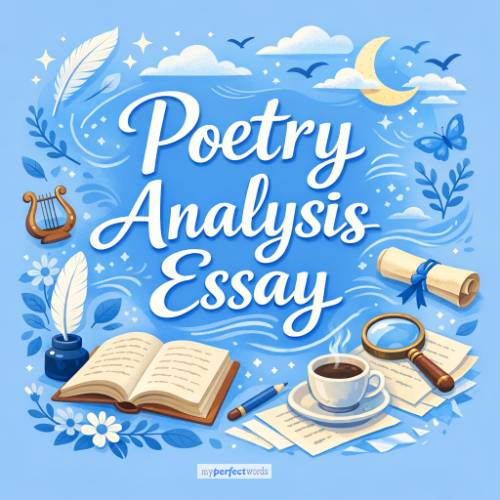What is a Literary Analysis Essay?
It is unlike a rhetorical analysis essay, which examines persuasive techniques, or an argumentative essay, which presents a clear viewpoint.
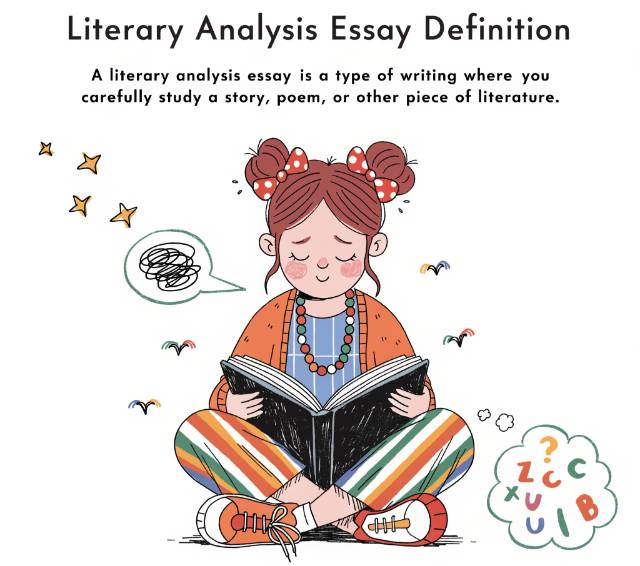
Instead of just telling what happens, you look deeper to understand how the author uses things like characters, themes, and symbols to share ideas or messages.
So, what is the purpose of a literary analysis essay? Let’s have a look:
The purpose of a literary analysis essay is to help you understand the text better by looking closely at its parts. It allows you to:
- Understand literary elements: See how things like themes, symbols, and tone make the story meaningful.
- Think critically: Go beyond just reading and explain what the text means and why it matters.
- Share your view: Write about your interpretation and back it up with examples from the text.
Types of Literary Analysis Essay
When it comes to literary analysis essays, there isn't just one approach to fit all. The type of literary analysis essay you write depends on your specific goals and the literary work you're analyzing.
Understanding these different types helps you choose the right approach for your assignment and allows you to tailor your analysis to what your instructor expects.
Here are the main types of literary analysis:
Theoretical Literary Analysis (Aesthetic or Formalist Analysis)
This type of analysis focuses on the text's form, structure, and aesthetics. It explores how literary elements like symbolism, imagery, and narrative style contribute to the overall meaning.
What It Analyzes: Form, structure, aesthetics, literary elements, and how they work together to create meaning. Purpose: Understanding how literary techniques and craft choices create meaning, independent of external context like history or author biography. When to Use This Type: When your assignment focuses on craft and technique rather than historical context or real-world applications. This approach works well for close examination of how a text functions as a piece of art. |
Close Reading Literary Analysis (Textual Analysis)
Close reading involves a detailed, microscopic examination of a specific passage or section within the text. It dissects the language, syntax, and word choice to uncover deeper meanings.
What It Analyzes: Individual words, phrases, sentences, and how their specific arrangement creates meaning and effect. Purpose: Uncovering layers of meaning through careful attention to language, discovering significance in details that might otherwise be overlooked. When to Use This Type: Best for short texts (poems, short passages from longer works) or when analyzing a particularly significant moment in a longer text. Ideal when your assignment asks you to examine a specific passage in depth. |
Applied Literary Analysis (Practical or Real-World Analysis)
This analysis applies the lessons or insights gained from literature to real-life situations, social issues, or practical concerns. It explores how literature can inform or influence the world beyond the page.
What It Analyzes: Connections between literature and real-world issues, contemporary relevance, and practical applications of literary themes. Purpose: Understanding how literature informs our understanding of society, human nature, ethics, and contemporary challenges. When to Use This Type: When your assignment asks about the text's relevance to current events or when exploring how literature can inform real-world understanding. Common in interdisciplinary courses. |
Comparative or Synergistic Literary Analysis
This type of analysis explores connections and contrasts between different texts, genres, or forms of art. It considers how literature interacts with other disciplines, such as history, psychology, or visual arts.
What It Analyzes: Similarities, differences, influences, and relationships between multiple texts or between literature and other art forms. Purpose: Understanding intertextual relationships, how artists influence each other, and how different works in conversation with each other create deeper meaning. When to Use This Type: When analyzing multiple texts in a single essay, or when exploring how different art forms or disciplines intersect. Common in upper-level courses and research papers. |
Contextual or Historical Literary Analysis
This analysis examines a text within its historical, cultural, or social context. It considers how the time period and societal influences shape the themes, characters, setting, and narrative.
What It Analyzes: The text in relation to the historical moment of its creation, considering cultural movements, social norms, and historical events. Purpose: Understanding how time period, cultural context, and historical circumstances shape a work's themes, characters, and narrative choices. When to Use This Type: When historical context is crucial to understanding the work, or when your assignment specifically asks about the text's relationship to its time period. Essential for understanding works from very different eras. |
Poetry Analysis
Poetry analysis deserves special attention because poetry uses unique techniques not found in prose fiction or drama. While the general principles of literary analysis apply to poetry, analyzing poems requires an understanding of poetry-specific elements.
What Makes Poetry Different:
Poetry compresses meaning into fewer words than prose, making every choice from individual words to line breaks significant. A poem might convey in 14 lines what a novel explores in 300 pages.
When to Use Poetry-Specific Analysis:
Whenever you're analyzing a poem, whether as part of a larger comparative essay or as a standalone analysis. Poetry's unique techniques require specialized attention that goes beyond general literary analysis.
For comprehensive guidance on analyzing poetry specifically, including detailed instruction on identifying poetic devices, understanding different poetic forms, and structuring your poetry analysis essay, see our complete poetry analysis essay guide.
Steps on How to Write a Literary Analysis Essay?
Writing a literary essay doesn't mean you have to share your thoughts only. Here is how you can start a literary analysis essay:
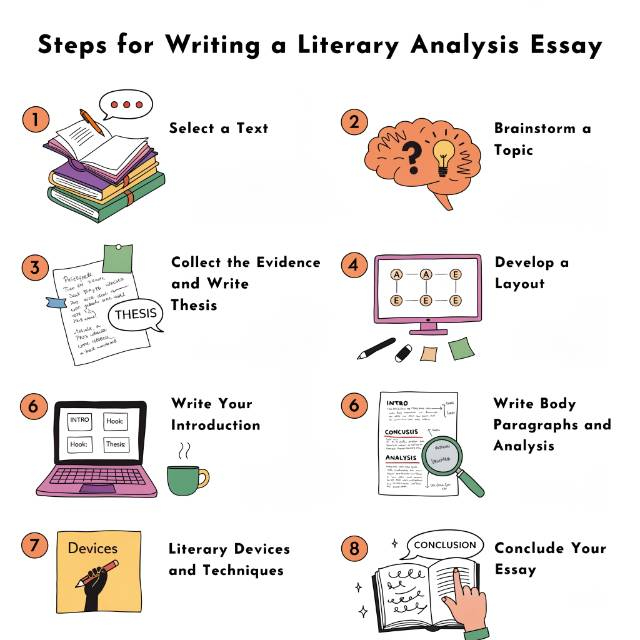
Step 1: Select a Text
To begin your literary analysis essay, pick a piece of writing that you like and is suitable for analysis. This could be a poem, a short story, a novel, a play, or any similar written work.
Tips for Choosing Your Text
For Short Texts (Poems or Short Stories):
For Longer Texts (Novels or Plays):
Explore Language Choices:
Understand Narrative Voice:
Analyzing Structure:
|
Struggling With Literary Analysis?
Get Expert Help With Your Literary Analysis Essay
Work with subject specialists who know how to analyze literature clearly and effectively.
Step 2: Brainstorm a Topic
Once you've chosen your text, the next step is to come up with a topic for your literary analysis essay. Think about what aspect of the text you find most interesting or want to explore.
It could be a theme, a character's development, the use of symbolism, or anything else that stands out to you.
Tips for Brainstorming a Topic:
|
While using these tips, check out our 220+ literary analysis essay topics ideas organized by category, genre, and difficulty level, and choose the best one for yourself.
Step 3: Collect the Evidence and Write a Thesis Statement
Now that you have your topic, it's time to gather evidence from the text to support your analysis. Look for quotes, passages, or examples that relate to your chosen topic. Once you have your evidence, use it to craft your thesis statement.
This statement should be a concise summary of the main point or argument you'll explore in your literary essay.
Tips for Collecting Evidence and Writing a Thesis:
|
Step 4: Develop a Layout
Creating an outline is like making a roadmap for your literary analysis essay. It helps you organize your thoughts and decide how to structure your essay. Here's how to develop a literary analysis essay rough layout:
Tips for Developing the Layout:
|
Need help ensuring your essay meets academic standards? Use our literary analysis essay outline template to structure your work properly from the start.
Step 5: Write Your Introduction
Your introduction sets the stage for your literary analysis essay. It should grab the reader's attention and provide essential information about the text you're analyzing.
Tips for Writing Your Introduction:
|
Step 6: Write Body Paragraphs and Analysis
Now that you've laid the groundwork with your outline, it's time to dive into writing the body of your literary analysis essay. Each paragraph should focus on one of the main points or arguments you outlined in the previous step.
Here is how to write body paragraphs:
- Topic Sentence: Start each body paragraph with a clear topic sentence that relates to your thesis.
- Provide Evidence: Use quotes or specific examples from the text to support your topic sentence.
- Analysis: After presenting evidence, analyze it.
- Transition: Use transition words and sentences to smoothly connect your ideas and guide the reader through your analysis.
Step 7: Literary Devices and Techniques
In this step, you'll explore the literary devices and techniques used by the author in the text. These devices, such as symbolism, imagery, foreshadowing, and irony, play a crucial role in conveying the author's message and creating a deeper layer of meaning.
You can dedicate specific paragraphs or sections of your essay to discuss these literary devices.
How to Analyze Literary Devices and Techniques:
- Identify Devices: Begin by identifying the literary devices used in the text. Look for symbols, metaphors, similes, imagery, alliteration, personification, and more. Note where and how they appear.
- Examine Their Purpose: Consider why the author used these devices. What do they add to the story or poem? How do they contribute to the overall message or theme?
- Impact on the Reader: Explain how these literary devices enhance the narrative and reinforce the themes or messages within the work.
- Provide Examples: Use specific examples from the text to illustrate and reinforce your analysis.
Step 8: Conclude your Essay
Concluding your essay is the final step in wrapping up your analysis and leaving a lasting impression on the reader. Here's how to write a conclusion paragraph for a literary analysis essay:
Key Elements of a Strong Conclusion:
- Key Findings Recap
- Significance Emphasis:
- Thought-Provoking Closing
- Avoid Introducing New Ideas
Common Mistakes of Literary Analysis Essay to Avoid
Summarizing instead of analyzing: Don't just retell the plot. Focus on how the author creates meaning, not just what happens in the story.
Weak thesis statements: Avoid obvious or vague claims like "Shakespeare was a great writer" or "The book has many themes." Be specific about what you're arguing.
Insufficient evidence: Back up every claim with textual support. One quote isn't enough for a major point.
Plot-heavy writing: Assume your reader knows the story. Spend your words on analysis, not summary.
Ignoring literary devices: Address the techniques the author uses. How do metaphors, symbols, or structure contribute to meaning?
Poor quote integration: Don't drop quotes without context or analysis. Introduce them, present them, then explain their significance.
Literary Analysis Essay Examples
In this section, we provide literary analysis examples that help students better understand and apply literary analysis. These examples cover various aspects, including examining text, exploring themes, and using literary devices.
Let’s check out some literary analysis essay examples pdf below
Downloadable Literary Analysis Essay Resource
Bottom Line
We hope this guide has provided you with the insights and clarity you need to start on your literary essay with confidence.
Literary analysis is a skill that develops with practice. Each essay you write will strengthen your ability to read critically, think analytically, and articulate your insights clearly. Don't be discouraged if your first attempts feel challenging. This is completely normal and part of the learning process.
However, if you find yourself short on time, remember that professional help is just a click away. Just get 'analytical essay help', and we will deliver a carefully crafted, custom written paper.
Turn Literary Texts into Clear, Insightful Analysis Without the Stress
Get professional literary analysis help trusted by students worldwide.
- Clear thesis and focused arguments
- In-depth analysis of themes and symbols
- 100% original, plagiarism-free writing
- Guaranteed on-time delivery
Let experts help you interpret literature with confidence and clarity.
Get Started Now